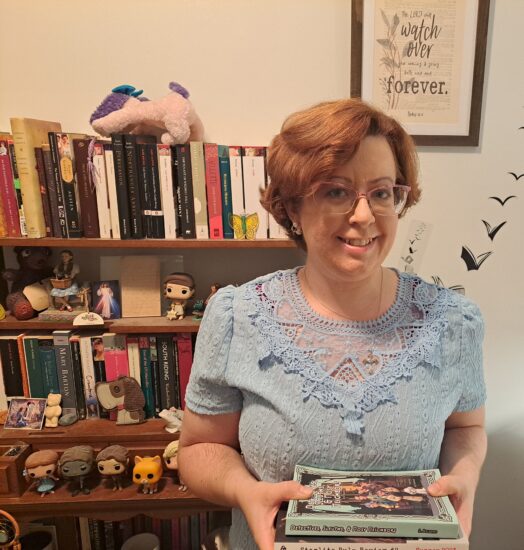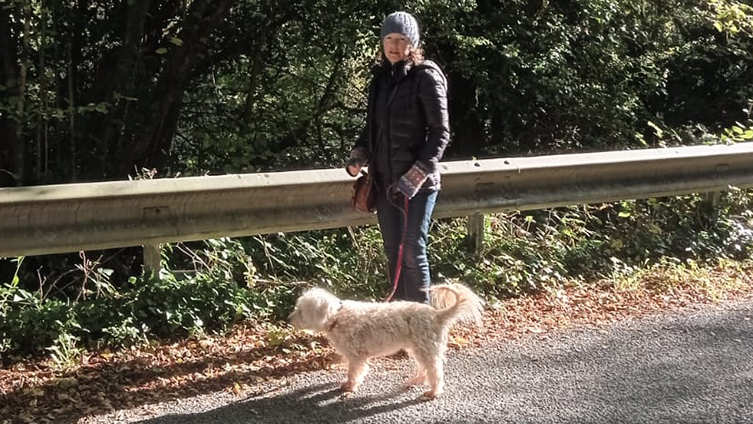
Our Writer Of The Week is Sandy Salisbury. The penultimate instalment of Sandy’s serial, “The Call Of The Prairie”, appears in the March 6 issue of “The People’s Friend”.
This is your first serial for the “Friend”. What made you choose the Western genre, and is it a favourite of yours?
I’ve always loved reading historical fiction, and a few years ago I thought I’d have a go at writing some myself. When choosing a time period (I’m not fussy; I enjoy reading any era pre-20th century), I hit upon my own great-grandparents’ homesteading adventure on the prairies of North America in the late 19th century.
I’m originally from the United States, having moved to the UK after I married. So it was fascinating to research my family history and the circumstances in which they lived.
I didn’t have much first-hand material, so I read other people’s memoirs, as well as articles and novels of the period. And even a department store catalogue from 1895, to get an idea of what goods were available and popular back then!
My initial goal was to write a full-length novel. I’ve now completed it, and hope to publish, but there are so many intriguing bits of trivia from my research I haven’t put in the novel.
You wrote the serial after having only written two short stories for the magazine. That’s quite a leap. Was it easy to make the transition from story to serial?
It was more the other way round! Writing a novel means you can indulge your penchant for detailed descriptions, and explore the characters’ thoughts and feelings in depth.
Writing a short story requires a different kind of discipline. I had to tame my desire to go off on tangents. Writing a serial freed me to paint the story into a bigger frame, although it still requires discipline, especially when working out an enticing hook at the end of each instalment.
I was greatly helped by reading other serials in “The People’s Friend” and observing how each instalment has a satisfying narrative curve, and yet leaves the reader wanting to know what happens next.
Tell us about your background – have you always written fiction, and what writing goals do you hope to achieve this year?
My day job is teaching English and Maths to international students. I’ve spent many years encouraging students in their creative writing, so I thought it was about time I tried it for myself.
I am in the process of drafting out another serial – not historical fiction – and last year I wrote a novel during NaNoWriMo, the writing challenge to complete an entire novel in a month. I chose the Western historical fiction genre again, and managed to complete a first draft. I’m still polishing it, and then we’ll see what happens with it.
I also have a non-fiction series of inspirational Bible reflections, “Steps Toward”, which I’m planning to add to this year.
Do you always finish reading a novel, or are there some you give up on for one reason or another?
I’m a bit stubborn when it comes to novels. I have to finish them, no matter what they’re like. Most of the time, I’m glad I did.
I’ve just finished a novel that was so deep and cerebral, I had to keep a dictionary close by, and practically take notes on the characters so I could remember who was who through the convoluted twists and turns of the plot. It was far more literary than anything I would attempt to write, but the ending justified my efforts, and I felt a sense of achievement by the last page.
At the moment I’m reading a memoir of a homesteader who was held captive by a tribe of Native Americans in the 1850s. The language is archaic and repetitive, but it is a treasure trove of first-hand detail, so I’m persevering.
Those very few novels whose storylines or characters disappoint for whatever reason are also instructional. I’ve made notes, on occasion, of how not to write!
Notebook and pencil or laptop? Kitchen table or study? Blank wall or inspiring view?
Mostly laptop. I have a little desk in the spare room overlooking our garden. It’s quiet, and encourages me to be disciplined when I’m working towards a word-count goal for the day.
However, I also find writing longhand useful at times. I can type faster than I can think; using pen and paper allows my thoughts to flow better.
I love finding a quiet corner in a café, ordering a big pot of tea and a cake, and indulging my imagination.
For my current serial, “The Call Of The Prairie,” I had several very productive writing days up on Dartmoor, sitting next to the Dart River in the glorious sunshine last summer.
Once, I dropped my notebook into the river and had to jump in after it! I received some curious glances as I laid out the pages on rocks to dry.
P.S., what’s your one top tip for an aspiring Writer Of The Week?
I’m an aspiring writer! I’m grateful for the generosity of the writing community in offering so much helpful advice online – websites, podcasts, YouTube videos, free publications. Especially at this time when we aren’t able to attend writing workshops or conferences.
If I’m allowed to mention one, it would be The Creative Penn, where Joanna Penn gives loads of wonderful tips.
My top tip would be to find your own voice. The only way you can do that is to keep writing.
It’s very important to listen to feedback from beta readers, writing friends, editors and other professionals. But in the end you have to find your own way – the way that satisfies you and brings you joy in your craft.
For more from our Writer Of The Week series, click the tag below.
If you want to be our Writer Of The Week one day, the first step is to submit your story! Click here for our guidelines.




